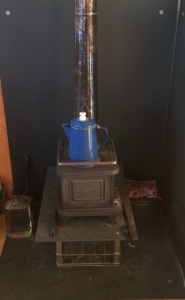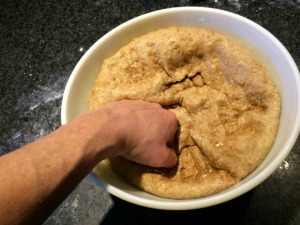
I baked bread and prepared my taxes.
Last Sunday, I baked bread and prepared my taxes. It was a productive combination, inspired by Julie’s recent post about Pomodoro, a time-management tool.
Since reading the post, I’ve used Pomodoro a few times, working with uninterrupted concentration for twenty-five minutes stretches separated by five-minute breaks. It suits both my work style and the demands of my tiny wood stove, which requires frequent feeding on very cold days.

The tiny but demanding wood stove in my studio.
In fact, when I’m out in my studio, this little wood stove serves as an organic Pomodoro, allowing me thirty-to-forty minute spells of writing between short breaks to feed the fire and longer ones to split wood. But I’d set aside Sunday for preparing the taxes, a job for the dining room table inside the house, where the wood stove and passive-solar gain keep the room warm with less effort.
While we often discuss how to earn money from writing, we haven’t talked much about the tax consequences of doing so. Mostly, it’s a matter of good bookkeeping, both keeping track of income and proof of expenses. I’ve been doing this for years, and it does get easier, mostly because I’ve set up systems, including a separate bank account and credit card for my writing business, an established business in home, and a method to track expenses according to what the IRS asks for in a Schedule C.

Spreading out on the dining room table.
Easier is not the same as fun, but if you earn income as a writer, you are obliged to report it and pay taxes accordingly. It’s better than not earning money in the first place.
To make the chore more palatable, I decided to bake bread, which would serve as the kind of organic timer similar to the studio woodstove and very much in keeping with the concept of the Pomodoro app.
I decided on bread because I’d said I’d bring bread to the friends’ who’d invited us over for dinner that night; I hadn’t expected the unintended, metaphorical, consequences – least of all the subject of a blog post.

Sunday brunch with Tim during a break from taxes while the bread dough rests.
Rather than use the bread machine, which we use for our every day loaf, I turned to my well-worn Tassajara Bread Book, and started a sponge. While it foamed, I set out all my files and answered the questions in the survey about economic events of the last year that our tax preparer sends. After adding flour and kneading the dough, Tim and I enjoyed Sunday brunch.
While the dough rested, I filled in the easy data: W-2’s, 1099’s, property taxes and the like. I discovered I need two numbers that I don’t have, so I scheduled time on Monday to make the phone calls to get them.
Fifty minutes later, I punched down the dough. While it rose a second time, I calculated how many miles I drove in 2015, how much money I spent keeping my car on the road, and how many of those miles and those expenses could be allocated to my writing practice. Then it was time to shape the dough into loaves.
While the loaves rose, I plucked the numbers for the Schedule C from my accounting software: IT, telephone, internet, office supplies and the like. I finished just as the loaves were ready to go in the oven. While the bread baked, I double checked my numbers and cleaned up.

Bread and Taxes done!
And then I sat down to my reward: taxes ready for the accountant, and the reward of fresh, nourishing, warm bread.
Deborah Lee Luskin blogs Wednesdays at Living in Place.


Wow! Organization at its finest! I’m wore out just READING this! Sounds like a great day of taxes and bread making to me! 😊
Baking the bread (and the dinner party later that day) were a lot more fun than doing the taxes – but they’re done! And that feels as good as the bread tastes! Thanks for reading and commenting on the post.
LOL! Whew! I’ll start on my taxes next week…. bummer. Wish I had some bread to go with that! :^)
Mm, I can almost smell that bread baking. Great way to stay organized and motivated (fresh bread will motivate me to do just about anything, possibly even my taxes). I’m inspired!
Thanks for the affirmation. My only questions is, Why didn’t I think of this sooner? I think it will become a new ritual. Maybe it will even change my attitude: I don’t mind paying my taxes as much as I dislike the bookkeeping angle. Best wishes with your bread & taxes.
I LOVE that little wood burning stove! And what a great way to time oneself. Yes indeed. Well, you’ve just made my morning a bit brighter. And congrats on the taxes and great bread!
Paul, you know this community is becoming so dear to each day. After a long days work, Reading such pieces gives me a sense of hope for success in writing career.
FYI, it’s a “Sardine” made by the Navigator Stove Company. It’s not air-tight, and it’s tiny, tiny, tiny, so it doesn’t hold a fire for long. But my studio is only 10×12 and very well insulated, so once I get the place warmed up, it stays warm. It’s hard to find a stove for such a tiny space!
I love that this little Sardine (the name of the stove) keeps me warm, but sometimes I wish it held a fire a bit longer. It requires a lot of attention! Thanks for your comments.
Deborah this is Amazing! The flow of activities seems to be in perfect harmony.
Nice to “see” you here again. Glad you find this inspiring. Baking bread certainly worked to keep me on task with the taxes.
Just in the middle of baking a loaf myself!
I love that you do something as grounding as baking bread in your nomadic life! I’m deeply rooted and still need that anchor of bread of in the oven! Thanks for reading and commenting.
I just realized I do the same thing, minus the wood stove. This was a really nice read, thanks for sharing!
Michele
https://nomadic674.wordpress.com/
Thanks for your kind words.
Don’t you just love the English language? The word we use for financial record keeping is book-keeping.
And, most writers hate doing it.
Yes! I do so love the English language! This is another one of those anachronistic words. Who keeps “books” anymore? Who actually “dials” a phone? We seem to hold on to words even as technology changes our behavior.
Thanks for pointing the irony here. All best.
I admire your laid-back multi-tasking skills.I’m in the midst of taxes, and I’m terrified of making mistakes. I need total concenrration, space, time.and waste so much just getting neurotic about having to recheck zillions of times. Bake bread? I just managed to burn the take-out. But as you say, taxes means some money did dribble in 🙂
Thanks for your comment, Bea. It’s more like the carrot approach to taxes: figuring out a reward system for getting them done. I don’t think of m yself as a multi-tasker, particularly. I tend to do one thing and then another. Baking bread allowed me to alternate between the two tasks, so that instead of drifing away from the taxes, I had some time pressure (bread rising) to concentrate, and a built-in time-keeper. It worked! Good luck with your tax filing.
Good it did work for you!